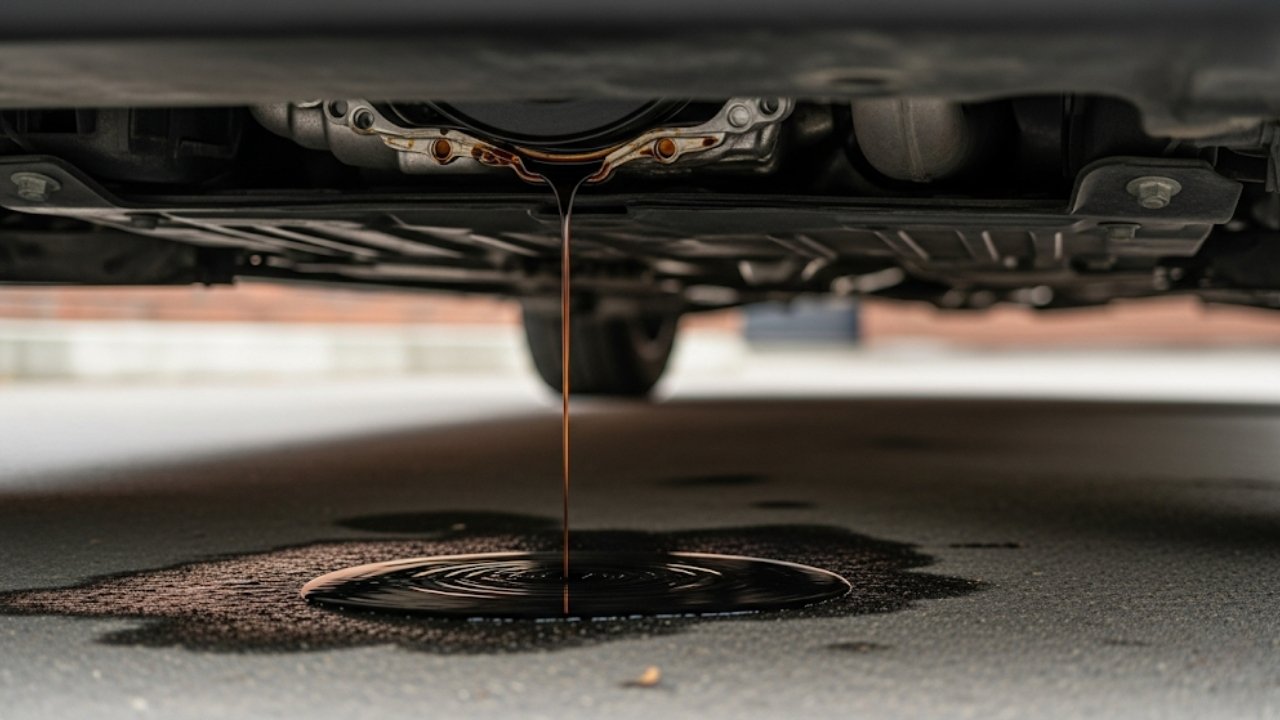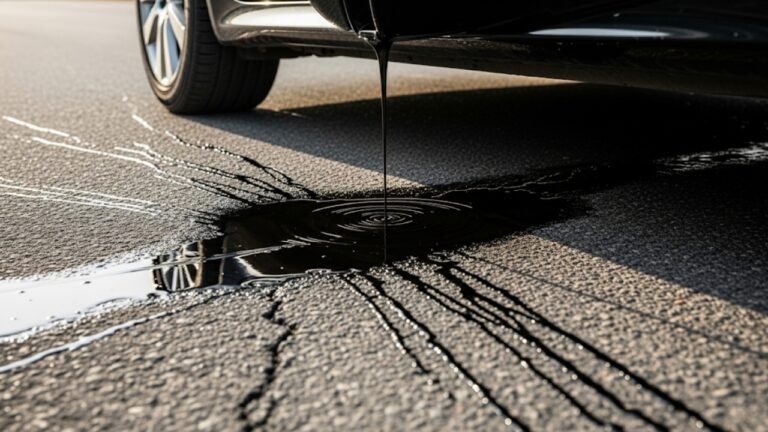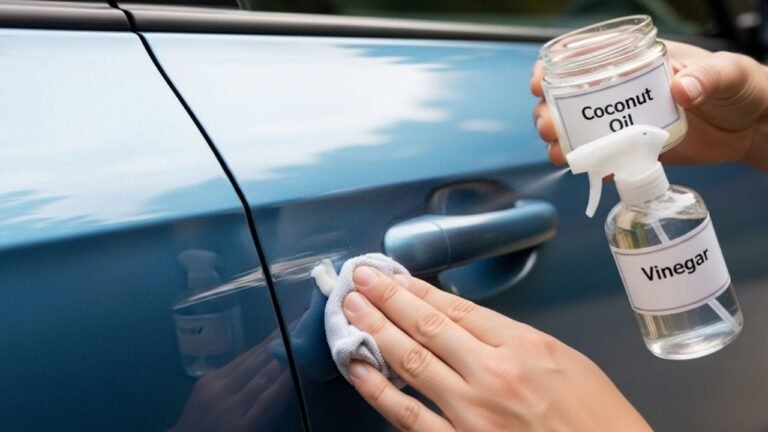Why Is Oil Leaking Out of My Car?

Have you ever walked out to your car in the morning only to find a dark, greasy puddle under it? That sinking feeling hits hard. It’s not just a stain on your driveway—it’s a warning. You’re probably asking, “why is oil leaking out of my car?” And that question deserves a clear, honest answer.
I’ve been there. The first time I noticed oil stains under my old Honda, I brushed it off as just some road grime. But days later, my engine was wheezing like a tired marathon runner. Turns out, ignoring that little puddle almost cost me the whole engine. That experience taught me something valuable: when oil leaks, your car is crying out for help.
In this guide, I’ll walk you through every possible cause behind oil leaking out of your car, how to spot the signs, and what you should do—whether it’s a quick DIY fix or a trip to the mechanic. Think of this as a heart-to-heart with a friend who knows what it’s like to juggle bills, car issues, and real life.
Let’s dive into the grease, shall we?
In This Article
- 1 1. Understanding the Role of Engine Oil in Your Car
- 2 2. Common Signs You’re Dealing with an Oil Leak
- 3 3. The Most Common Reasons Why Oil Leaks from a Car
- 4 4. DIY Diagnosis: How to Find the Source of an Oil Leak
- 5 5. Can I Drive With an Oil Leak?
- 6 6. How to Fix Oil Leaks (DIY vs. Mechanic)
- 7 7. Preventing Oil Leaks Before They Happen
- 8 8. Realistic Repair Costs for Oil Leaks
- 9 9. FAQs About Oil Leaks
- 9.1 ❓ Q1: Is an oil leak dangerous?
- 9.2 ❓ Q2: Can I use stop-leak products?
- 9.3 ❓ Q3: How long can I drive with a small oil leak?
- 9.4 ❓ Q4: Why does oil only leak when the engine is off?
- 9.5 ❓ Q5: How do I know if oil is leaking or burning?
- 9.6 ❓ Q6: Could an oil leak mean my engine is about to die?
- 9.7 ❓ Q7: Why do older cars leak oil more?
- 9.8 ❓ Q8: What happens if I ignore an oil leak?
- 10 Final Thoughts: Learning From the Leak
1. Understanding the Role of Engine Oil in Your Car

Engine oil has a few key jobs:
-
It lubricates engine parts so they don’t grind together.
-
It helps cool the engine by carrying heat away.
-
It cleans internal parts by trapping dirt and debris.
-
It provides a protective seal between piston rings and cylinder walls.
Without oil, your engine parts rub metal-on-metal, creating heat and friction that can destroy your engine fast. That’s why oil leaking out of your car is no small matter—it’s like your body losing blood.
So when oil disappears or leaks out, the engine can overheat, seize up, or wear out way too soon. That’s not just bad news. It’s expensive.
2. Common Signs You’re Dealing with an Oil Leak
Sometimes, the signs are obvious. Other times, you won’t know until your engine starts sounding like a coffee grinder.
Here’s how to spot it early:
Warning Signs of an Oil Leak:
-
Oil spots or puddles under your car
-
A burning oil smell when the engine is hot
-
Blue smoke from the exhaust (yep, that’s oil burning)
-
Your oil light flickers on
-
Low oil levels when you check the dipstick
-
Dirt or sludge building up on the engine
Let me tell you, that burning smell? It’s awful. One time on a road trip through the hilly roads of Sylhet, I ignored that smell for two days. I thought it was just because the engine was working hard. By the time I reached the next town, I was topping off oil every few hours. Lesson learned.
Here’s a quick table to help you connect the symptom to the cause:
| Symptom | Possible Cause |
|---|---|
| Puddle under engine | Leaking oil pan or gasket |
| Burning oil smell | Oil dripping on hot engine parts |
| Blue smoke from exhaust | Oil entering combustion chamber |
| Oil light on dashboard | Low oil pressure from a leak |
| Visible oil on engine | Valve cover gasket or seals failing |
3. The Most Common Reasons Why Oil Leaks from a Car
So, why is oil leaking out of my car? Well, there isn’t just one reason. It could be as simple as a loose plug—or as serious as a cracked engine block.
Let’s go through the top culprits.
A. Worn or Damaged Gaskets
Gaskets are like your car’s Teflon tape. They seal connections between metal parts, especially around the engine. Over time, heat and age can crack or harden these gaskets.
-
Valve cover gasket: Often leaks down the side of the engine.
-
Oil pan gasket: If this fails, you’ll find big puddles under your car.
-
Timing cover gasket: Tricky to access, but can lead to slow, hidden leaks.
Once my cousin drove for weeks with a bad oil pan gasket. His mechanic later said the engine was “running on oil fumes.” It’s a slow killer.
B. Faulty Oil Filter or Loose Drain Plug
Every time you change your oil, the drain plug and filter are removed and reinstalled. If they’re not sealed properly, guess what? You’ve got a leak.
-
A loose drain plug can drip steadily.
-
A cross-threaded filter or one with a worn rubber seal can fail under pressure.
Pro Tip: If your leak starts right after an oil change, check these two things first. Always.
C. Cracked Oil Pan
This one’s brutal. If you’ve hit a pothole or a piece of debris at high speed, your oil pan could crack. Aluminum pans are especially vulnerable.
Oil won’t just leak—it will pour out. You might even notice oil pressure dropping within minutes. In that case, stop the car immediately. Continuing to drive could mean catastrophic engine damage.
D. Bad PCV Valve
The Positive Crankcase Ventilation (PCV) valve helps reduce pressure inside your engine. When it clogs, pressure builds up—and oil gets forced out through gaskets and seals.
Symptoms might include:
-
Leaks from multiple spots
-
Oil in the air filter
-
Engine running rough
Replacing a PCV valve is cheap. Ignoring it? Not so much.
E. Rear Main Seal Failure
This is the big one. The rear main seal sits between your engine and transmission. If it leaks, you might see oil dripping at the rear of the engine. Repairing it requires pulling out the transmission—so it’s labor-heavy and costly.
I’ve seen people sell their cars just to avoid this fix. That’s how serious it can get.
F. Overfilled Oil
Believe it or not, too much oil can also cause leaks. It creates extra pressure in the system and forces oil past seals.
Always use the correct oil level—check your dipstick after an oil change and stick to your owner’s manual.
4. DIY Diagnosis: How to Find the Source of an Oil Leak
Now that we know the usual suspects, let’s talk about how to play detective.
Step-by-Step Leak Detection:
-
Look under the car: Check the exact location of the drip.
-
Check the oil level: Use the dipstick.
-
Inspect the oil filter and drain plug: Any sign of looseness or drips?
-
Use a flashlight: Look around gaskets and seals.
-
Clean the engine: A clean engine helps spot new leaks faster.
-
Use UV dye (optional): Mechanics use a special dye and blacklight to trace leaks.
Still unsure? Take photos of the leak area and show them to a trusted mechanic. Sometimes, a second pair of eyes helps.
5. Can I Drive With an Oil Leak?
The short answer? It depends on how bad it is.
If it’s a slow leak—like a few drops after parking—you might be okay for a short time. Just keep topping off the oil and monitor closely.
But if oil is gushing or you see that oil light? Stop driving.
Driving with an oil leak risks:
-
Engine overheating
-
Permanent engine damage
-
Fire hazards (especially with oil hitting hot exhaust parts)
Would you run a marathon with a bleeding leg? Probably not. Your engine feels the same way.
6. How to Fix Oil Leaks (DIY vs. Mechanic)
So, you’ve figured out that oil is leaking out of your car—now what? Do you grab a wrench and get to work, or call a mechanic?
It depends on where the leak is coming from and your comfort level with tools.
DIY Fixes You Can Try at Home:
If you’re handy and the leak is minor, here are some repairs you can try:
-
Tighten the oil drain plug or replace its washer (cost: $2–$5)
-
Replace a leaky oil filter (cost: $10–$20)
-
Use an oil stop leak additive – these swell seals temporarily (cost: $10–$15)
-
Swap out the valve cover gasket (cost: $20–$50 and 1–2 hours)
I once fixed a slow leak on my mom’s car just by replacing a $3 rubber gasket. It felt great not having to drop hundreds at the garage.
But here’s the key: if oil is leaking near the transmission or timing cover, don’t risk it. These jobs require lifting the engine or removing major parts. That’s better left to a professional.
7. Preventing Oil Leaks Before They Happen
As they say, “an ounce of prevention is worth a pound of repairs.” That couldn’t be truer when it comes to engine oil.
Here are simple habits to avoid future leaks:
✅ Best Practices to Keep Oil Where It Belongs:
-
Change your oil on time using the right type and grade.
-
Always replace gaskets and washers during oil changes.
-
Avoid overfilling the oil reservoir.
-
Use quality oil and filters—cheap brands often break down faster.
-
Inspect your engine regularly for early signs of leakage.
Make it a routine—maybe check under the car every Sunday before your morning tea. Catching a few drops now could save you thousands later.
8. Realistic Repair Costs for Oil Leaks
Wondering what it might cost to fix oil leaking out of your car? Here’s a quick breakdown:
| Repair Type | Estimated Cost (USD) | Difficulty |
|---|---|---|
| Oil filter or drain plug replacement | $10 – $50 | Easy (DIY-friendly) |
| Valve cover gasket | $100 – $300 | Medium |
| Oil pan gasket | $200 – $600 | Medium–Hard |
| Rear main seal | $700 – $1,500+ | Hard (mechanic only) |
| Timing cover gasket | $500 – $1,200 | Hard |
| Cracked oil pan | $300 – $900+ | Medium–Hard |
If you’re unsure, get multiple quotes. A second opinion has saved me from getting overcharged more than once.
9. FAQs About Oil Leaks
Here are some of the most common (and important) questions people ask about why oil is leaking out of my car:
❓ Q1: Is an oil leak dangerous?
A: Yes. Even a slow leak can cause engine damage over time. If the oil touches hot engine parts, it could even start a fire.
❓ Q2: Can I use stop-leak products?
A: Yes—but only for minor leaks. They work temporarily by swelling seals, but they’re not a long-term fix.
❓ Q3: How long can I drive with a small oil leak?
A: Maybe days or weeks—but you must monitor the oil level constantly. If it worsens or your oil light comes on, stop immediately.
❓ Q4: Why does oil only leak when the engine is off?
A: That’s usually due to cooling metal contracting, allowing gaps to form in gaskets or seals. Heat expansion can temporarily “seal” the gap.
❓ Q5: How do I know if oil is leaking or burning?
A: Burning oil creates blue smoke from your exhaust. Leaking oil leaves visible drips or puddles.
❓ Q6: Could an oil leak mean my engine is about to die?
A: Not always, but it’s a red flag. If left untreated, it can lead to serious engine damage.
❓ Q7: Why do older cars leak oil more?
A: Age wears down seals, gaskets, and rubber parts. Older engines often develop leaks just from normal use and heat cycles.
❓ Q8: What happens if I ignore an oil leak?
A: You risk:
-
Low oil pressure
-
Engine overheating
-
Total engine failure
-
Expensive repairs
Final Thoughts: Learning From the Leak
Finding out that oil is leaking out of your car can feel overwhelming. But now that you know what to look for, why it happens, and how to fix it—you’re back in control.
It’s like finding a cut on your skin. You wouldn’t ignore it—you’d clean it, bandage it, and prevent infection. Your car deserves the same care. A little attention today prevents bigger heartbreak tomorrow.
I’ve learned from experience (and a few roadside breakdowns) that the key is staying informed and acting early. Whether it’s a minor drip or a major flood, you now have the knowledge to face it head-on.
So next time someone asks “why is oil leaking out of my car?”, you’ll not only know the answer—you’ll probably be the one helping them solve it.






